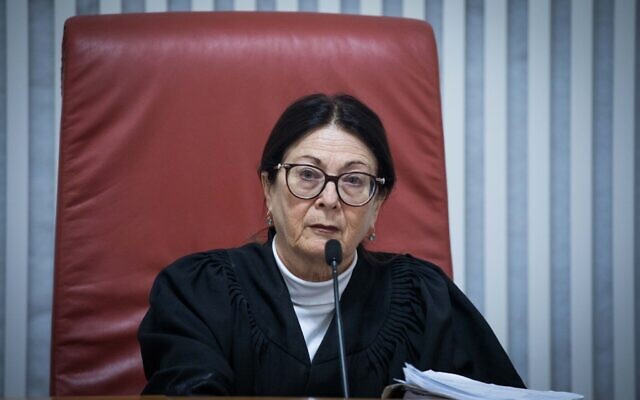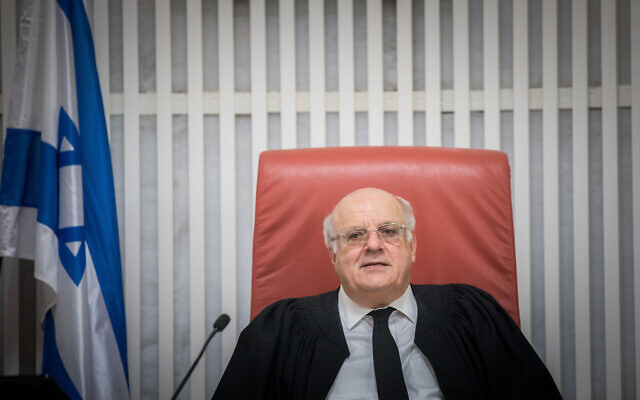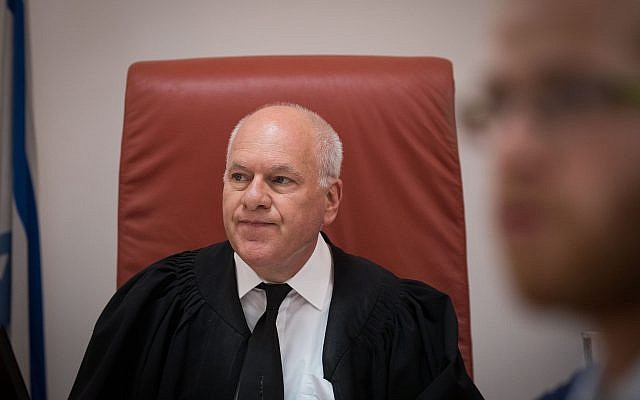Pro-Netanyahu daily cites legal official saying the judges set to hear petition against allowing lawmaker facing charges to form government are prejudiced

The High Court of Justice on Wednesday swiftly rejected claims made in a newspaper report that said the judges who are to rule on whether Prime Minister Benjamin Netanyahu may assemble a government, due to a pending indictment against him, were specifically selected to ensure the decision goes against him.
In a statement, the court said the judges who are to rule on the petition were chosen due to their seniority and no other reason.
“All interpretations raised in this context are baseless and irresponsible,” the court said.
The pro-Netanyahu Israel Hayom daily had published a front-page article declaring that the petition hearing is a “rigged game.”
The Hebrew-language paper cited a “senior legal official” who claimed Supreme Court President Esther Hayut had chosen “activists,” who were more likely to come to a unanimous decision against the prime minister, for the panel that will hear the petition.
“In light of the publication, this morning, we are clarifying the composition assigned to debate the petition in the matter of the prime minister this coming Tuesday was done according to the rules of seniority — the most senior panel sitting in the Supreme Court, (excluding Judge [Neal] Hendel, who is the chairman of the Central Elections Committee,” the statement from the court said.

The three-judge panel will be made up of Hayut, Deputy Chief Justice Hanan Melcer, and Justice Uzi Vogelman. All three are considered “particularly liberal” and “activists,” the paper wrote.
According to the paper the High Court has in the past had seven, nine, or even 11 judges gathered to rule on legal principles that were less significant than the matter at hand, which could have a profound impact on the upcoming elections.
Hayut, the paper wrote, “doesn’t worry about intervening even in the most sensitive matters of government, and more than once has criticized the current government and Justice Minister Amir Ohana over his attempts to balance the power of the [justice] system against the other branches of government.”
Ohana, a staunch Netanyahu ally, has attacked the justice and law enforcement establishment over the cases against the prime minister, accusing state prosecutors who operate under his purview of engaging in a blind persecution of public officials they feel threaten their standing, all while being supported by a “cult” of fawning reporters.
Regarding Melcer, the paper recalled his past involvement with what it said were left-leaning political groups. Fogelman, the paper said “is considered an activist and a liberal, perhaps even more so than Melcer.”

Netanyahu himself on Sunday implied that the High Court does not have the authority to rule on the petition.
“In a democracy, it is the people who decide who will lead them, not anyone else. Otherwise, it just isn’t democracy,” Netanyahu said in a video posted to social media shortly after the court’s announcement that it would hear the case.
The petition against Netanyahu’s potential reelection comes as the prime minister has been accusing prosecutors, the media, and the judiciary of working together in an effort to bring him down on trumped-up corruption charges.
Last month, Attorney General Avichai Mandelblit announced an indictment against Netanyahu in three corruption cases, which include charges of breach of trust, fraud, and, in the most serious case, bribery.

The court’s decision to rule on the question of Netanyahu’s legal eligibility to stand for office appears set to spark a new round of political skirmishing, and will likely be used by Netanyahu’s campaign to advance his assertion that the legal system is staging an “attempted coup” in a bid to topple the right.
Israeli law stipulates that a sitting prime minister is only required to resign after he or she is convicted of a serious crime and all appeals have been exhausted. But judicial precedent from the early 1990s and longstanding practice have set a stricter standard for other ministers, who have been forced to resign their cabinet posts, at least temporarily, once indictments have been announced in their cases.
The petition in question was brought in mid-December by attorney Dafna Holtz-Lachner in the name of a group of 67 well-known public figures, academics, and tech executives. It argues that the law’s leniency toward an indicted prime minister only refers to a serving premier, not an MK seeking a new appointment to the post, like Netanyahu, who is officially an interim prime minister. It asks the question: based on the standard according to which a regular cabinet minister must resign when under indictment, can an MK in a similarly compromised legal position be appointed prime minister in the first place?
The appeal also says that voters have the right to know ahead of the upcoming election if Netanyahu can legally be tasked with forming a government by President Reuven Rivlin after election day.
Netanyahu’s legal woes are partially responsible for an unprecedented year-long political deadlock that will see a third election in 11 months held on March 2, 2020. The election was called after Netanyahu twice failed to form a government, following the April 9 and September 17 elections. Challenger Benny Gantz of the Blue and White party also failed in his attempt to cobble together a ruling coalition last month.
The centrist Blue and White has refused to join a coalition either with Netanyahu as a prime minister under indictment or one that would require it to support parliamentary immunity for the longtime premier.
As reported by The Times of Israel
